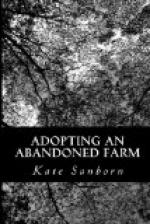I thank him for that expressive compound word. Almost every one might, like Grace Greenwood and Gautier, write a History of my Pets and make a readable book. Carlyle, the grand old growler, was actually attached to a little white dog—his wife’s special delight, for whom she used to write cute little notes to the master. And when he met with a fatal accident, he was tenderly nursed by both for months, and when the doctor was at last obliged to put him out of pain by prussic acid, their grief was sincere. They buried him at the top of the garden in Cheyne Row, and planted cowslips round his grave, and his mistress placed a stone tablet, with name and date, to mark the last resting place of her blessed dog.
“I could not have believed,” writes Carlyle in the Memorials, “my grief then and since would have been the twentieth part of what it was—nay, that the want of him would have been to me other than a riddance. Our last midnight walk together (for he insisted on trying to come), January 31st, is still painful to my thought. Little dim, white speck of life, of love, of fidelity, girdled by the darkness of night eternal.”
Beecher said many a good thing about dogs, but I like this best: Speaking of horseback riding, he incidentally remarked that in evolution, the human door was just shut upon the horse, but the dog got fully up before the door was shut. If there was not reason, mirthfulness, love, honor, and fidelity in a dog, he did not know where to look for it. Oh, if they only could speak, what wise and humorous and sarcastic things they would say! Did you never feel snubbed by an immense dog you had tried to patronize? And I have seen many a dog smile. Bayard Taylor says: “I know of nothing more moving, indeed semi-tragic, than the yearning helplessness in the face of a dog, who understands what is said to him, and can not answer!”
Dr. Holland wrote a poem to his dog Blanco, “his dear, dumb friend,” in which he expresses what we all have felt many times.
I look into your great brown eyes,
Where love and loyal homage
shine,
And wonder where the difference lies
Between your soul and mine.
The whole poem is one of the best things Holland ever did in rhyme. He was ambitious to be remembered as a poet, but he never excelled in verse unless he had something to express that was very near his heart. He was emphatically the Apostle of Common Sense. How beautifully he closes his loving tribute—
Ah, Blanco, did I worship God
As truly as you worship me,
Or follow where my Master trod
With your humility,
Did I sit fondly at his feet
As you, dear Blanco, sit at
mine,
And watch him with a love as sweet,
My life would grow divine!
Almost all our great men have more than one dog in their homes. When I spent a day with the Quaker poet at Danvers, I found he had three dogs. Roger Williams, a fine Newfoundland, stood on the piazza with the questioning, patronizing air of a dignified host; a bright-faced Scotch terrier, Charles Dickens, peered at us from the window, as if glad of a little excitement; while Carl, the graceful greyhound, was indolently coiled up on a shawl and took little notice of us.




